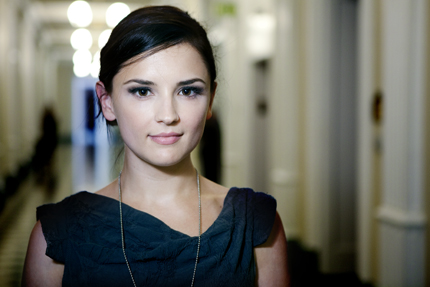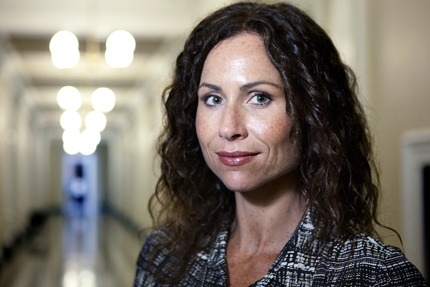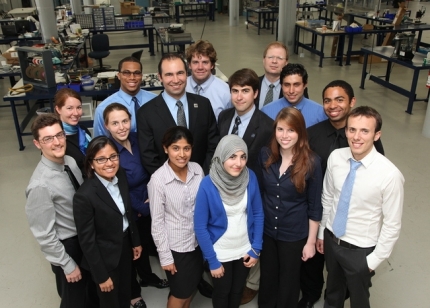Champions of Change Blog
Arts Education - Thinking Outside the Box
Posted by on August 1, 2011 at 3:40 PM EDTEd. Note: Champions of Change is a weekly initiative to highlight Americans who are making an impact in their communities and helping our country rise to meet the many challenges of the 21st century.
Why is it that in every facet of the business world, ‘thinking outside of the box’ is revered? What, then, is ‘thinking outside of the box,’ exactly? Well, ‘thinking outside of the box’ has a simple meaning – it’s simply tapping into our imagination. Our imagination is the place where all of our innovative thoughts and ideas dwell. That said, I believe every innovative thought comes from a creative state of mind. Whether it's Google, the iPad or a Stealth Bomber—all of these inventions were born out of creative states of mind. The arts are the sole fuel for creativity. We, as Americans, must integrate the arts into our education system in order to produce more intelligent and creative citizens. Now, when I say ‘the arts,’ I'm not talking about kids singing and dancing their way through school. I'm talking about implementing the arts into how we teach our young people. Integrating the arts nationwide into our education system will have a myriad of positive effects, the most important being that our youth will learn to become creative thinkers. And, creative thinking is how all of our greatest scientific achievements came to fruition. Creative thinking is what's going to give us the answers on how to manage global warming, solve the worldwide water crisis, and effectively produce clean energy across the country. It all begins with our American education system.
So, if we want to produce the best mathematicians, engineers, architects, doctors and scientists, it's imperative that we integrate the arts into our nationwide education system.
"Imagination is more powerful than knowledge" - Einstein
Omar Epps is an actor and an Advisory Board Member of The Creative Coalition.
Learn more about EducationEnriching Our Classrooms Through Arts Education
Posted by on August 1, 2011 at 2:35 PM EDTEd. Note: Champions of Change is a weekly initiative to highlight Americans who are making an impact in their communities and helping our country rise to meet the many challenges of the 21st century.

I want to thank the White House Office of Public Engagement for organizing this special session of Champions of Change.
At the roundtable, I met so many incredible people dedicated to the personal and academic development of children. They shared their success stories, ideas, and sited irrefutable data as to why the arts are so vital in America's schools. As the meeting concluded, they resolved to band together to keep fighting for the presence and funding of arts education.
The conversation truly affected me, because it made me reflect on my own school years. I was a good student, but many subjects didn't come easily to me. Without creative outlets, I know I would have felt inferior to my classmates, and I know many students feel the same today.
In difficult economic times, long term investments are often the first thing thrown to the wayside, and we all know why this measure is sometimes seen as necessary. However, I firmly believe that the scholastic development of children should never fall victim to this shortsightedness. The arts are not what keep so many American schools painfully underfunded; they are, in fact, what makes them rich in immeasurable ways.
I want to thank the Champions who were present for their inspiring work. I felt extremely blessed to be a part of that dialogue, and hope that I may be of service to these passionate and driven leaders in the future. I'd like to thank the White House Office of Public Engagement for their hospitality and inclusion of The Creative Coalition in this unique distinction. What a day.
Rachael Leigh Cook is an actor and sits on the Board of Directors for The Creative Coalition.
Learn more about EducationArts Education - A Necessity, not a Luxury
Posted by on August 1, 2011 at 1:20 PM EDTEd. Note: Champions of Change is a weekly initiative to highlight Americans who are making an impact in their communities and helping our country rise to meet the many challenges of the 21st century.

I was fortunate enough to have had a really good education. I reference my education every day as a mother, an actor and a human being. Without music in my curriculum, I never would have understood math. I am so grateful to the teacher who, long before there was scientific evidence being published which supported his theory, encouraged me to explore my love of music as a way to help unscramble my block with mathematics. In fact, the cornerstones of my academic achievement came from my arts education: learning Shakespeare like a new language made learning other languages second nature, and devising plays and poetry fostered a lifelong love of literature and reading.
Art and music required my left and right brain to trade off in such a collaborative way that I learned to approach more linear problems much more creatively. And, there it is. The arts give children the tools for creative thinking, and creative thinking not only serves children in every aspect of scholastic development, but it also creates people who think outside the box in whatever they end up doing.
We can't expect children in America to do without an arts education. It is a vital gift we must give them, not as a luxury, but as a necessity.
Minnie Driver is an actor and a member of The Creative Coalition.
Learn more about EducationArts and Our Economy
Posted by on August 1, 2011 at 12:09 PM EDTEd. Note: Champions of Change is a weekly initiative to highlight Americans who are making an impact in their communities and helping our country rise to meet the many challenges of the 21st century.
As an actor, producer, director, and President of The Creative Coalition, I would like to thank the White House’s Champions of Change program for recognizing the important role that arts play in our society. The Champions of Change who were present at the White House are all living proof that the arts are a crucial part of our education system, our economy, and our cultural heritage.
I don’t believe it is commonly known that entertainment is America’s second largest export, and that millions of Americans earn their livelihoods through the arts and in ancillary occupations. It seems to me that we too often look at art as something extra, a luxury item, something that is disconnected from our daily lives and our economy. But in reality, what is more connected and interwoven in our economy than a film production that provides jobs for thousands of people behind-the-scenes? It’s not just the actors that benefit – it’s the craftsmen, drivers, carpenters, editors, technicians and more who work so hard to bring that film to the screen.
Learn more about EducationA Little Help Goes a Long Way for Clean Tech Company
Posted by on August 1, 2011 at 11:15 AM EDTAsk Dr. Riccardo Signorelli, CEO of clean-technology company FastCAP Systems, what role the government may have had in getting his business off the ground and his answer is brief.
“The American Recovery and Reinvestment Act made FastCAP possible,” Signorelli said. “Simple as that.”
Signorelli and John Cooley, the co-founder of FastCAP, came into business following six years of research and development in the MIT Laboratory for Electromagnetic and Electronic Systems (LEES) Lab. At MIT, Signorelli and Cooley discovered they had come up with a revolutionary energy storage technology.
Bringing Classical Music to Underserved Youth
Posted by on July 29, 2011 at 7:37 PM EDTEd. Note: Champions of Change is a weekly initiative to highlight Americans who are making an impact in their communities and helping our country rise to meet the many challenges of the 21st century.
This week’s experience of meeting and exchanging ideas with a variety of arts and cultural leaders in the country was enriching, eye-opening and exciting. Having the White House serve as the avenue and catalyst for such a conversation was both poignant and encouraging. At a time when arts funding is in great scarcity and music and arts education in public schools is becoming extinct, having these issues brought to light on the highest level by great luminaries in the field is particularly empowering. I was not only moved by the insightful perspectives shared by fellow champions, but also, further inspired to continue my own efforts in issues of equity in access and diversity.
I serve as Founder and President for the international Sphinx Organization, whose mission it is to provide unprecedented access to music education among underserved youth, as well as to build diversity in classical music. Headquartered in Detroit, a legendary historic cultural landmark, Sphinx has satellite offices in New York, Chicago and London. Through its educational efforts, Sphinx reaches approximately 30,000 youth throughout the country. Our main educational grassroots initiative, The Sphinx Preparatory Music Institute, serves underserved youth in Detroit, with a track record of 100% high school graduation rate (compared to 30% graduation rate in Detroit Public Schools). When I launched Sphinx 15 years ago, nationally, Blacks and Latinos each represented approximately 1.5% of American orchestras (dramatically disproportionate to their population representation). Today, as a result of our consistent efforts, the numbers are nearly doubled. We see this as positive change, while recognizing the magnitude of work is ahead of us. Through Sphinx’s flagship program, its national competition for young Black and Latino string players, we foster the development of young artists of tomorrow, many of whom will join the ranks of orchestras, serve as faculty of music schools and dedicate themselves to solo and chamber music performance.
Learn more about Education
- &lsaquo previous
- …
- 165
- 166
- 167
- 168
- 169
- 170
- 171
- 172
- 173
- …
- next &rsaquo
White House Blogs
- The White House Blog
- Middle Class Task Force
- Council of Economic Advisers
- Council on Environmental Quality
- Council on Women and Girls
- Office of Intergovernmental Affairs
- Office of Management and Budget
- Office of Public Engagement
- Office of Science & Tech Policy
- Office of Urban Affairs
- Open Government
- Faith and Neighborhood Partnerships
- Social Innovation and Civic Participation
- US Trade Representative
- Office National Drug Control Policy
categories
- AIDS Policy
- Alaska
- Blueprint for an America Built to Last
- Budget
- Civil Rights
- Defense
- Disabilities
- Economy
- Education
- Energy and Environment
- Equal Pay
- Ethics
- Faith Based
- Fiscal Responsibility
- Foreign Policy
- Grab Bag
- Health Care
- Homeland Security
- Immigration
- Innovation Fellows
- Inside the White House
- Middle Class Security
- Open Government
- Poverty
- Rural
- Seniors and Social Security
- Service
- Social Innovation
- State of the Union
- Taxes
- Technology
- Urban Policy
- Veterans
- Violence Prevention
- White House Internships
- Women
- Working Families
- Additional Issues


